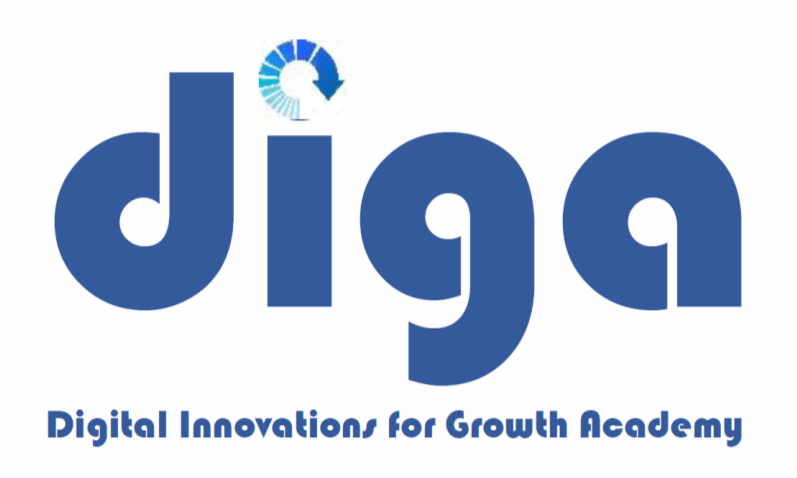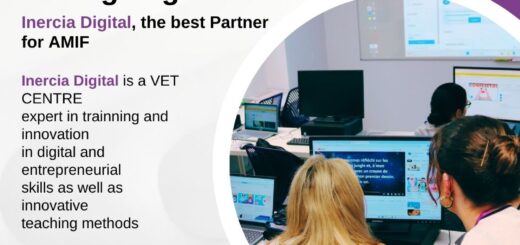Being ended the research of DIGA project / Terminada la investigación/estudio del Proyecto Diga
 The first result of the DIGA project finished last September: research and study of the role and use of digital technologies in business education.
The first result of the DIGA project finished last September: research and study of the role and use of digital technologies in business education.
The conclusions will be presented and reviewed in the 3rd Transnational Partnership Meeting that will take place on October 28th-29th 2015 in Drammen, Norway.
The report has been prepared by the DIGA project partners:
– B.Hynes; Y. Costin; Kemmy, Business School, University of Limerick, Ireland;
– L. McMullan; L. Anderson; H. Millane; A. Price; The Women’s Organisation, Liverpool;
– S. Gavez; M. Karničnik; T. Rugelj; J. Šest; Economic Institute Maribor, Human Rescource, Development Centre, Maribor, Slovenia;
– A. Kisieliene; L. Mecajeva; Social Innovation Fund, Lithuania;
– C. Martínez; Inercia Digital S.L.; C. Luna, University of Huelva, Spain
– N. Dermendjieva; S. Bezuhanova; Bulgarian Centrе of Women in Technology, Bulgaria
– E. Fabry; M.Sangiuliano, European Centre for Women and Technology – ECWT
(Drammen; Limerick, Liverpool, Maribor, Huelva, Kaunas, Sofia, August 2015)
The proliferation of digital technologies in personal and business contexts has had a higher importance with the arrival of the social networks platforms and it has created new ways of social interaction, dialogue, interchange and collaboration in different context. For example, among individuals with a personal and social familiar capacity.
The student and trainer, as individuals and users who interact with business. The enterprises (public and private institutions) and, like those, they are in contact with the digital users and other influential actors. The digital competence is a generalized strength that drives innovation and new business opportunities bringing individuals and organizations in an interconnected and changing digital environment.
The DIGA research presents the key tendences for the increased use of the digital technologies from the didactic perspectives of trainers/educators of the enterprises and the entrepreneurial student of the enterprise is examined and their learning preferences and expectations will identify the factors to bear in mind when digital technologies are incorporated to the curriculum of the enterprise. This information has been compared with the knowledge obtained from the educator/trainer of the enterprise who strategically determines the value of the digital technologies and how the resources of financial, technical and educational training are and the development of the points of view.
For the purposes of DIGA project, the research had an investigation in two standards: theoretical and empirical investigation of the role and practices of the digital technology among a tripod of interrelated people, specifically, entrepreneurs, students of business topics and trainers (those related to teaching, formation and competences on one hand and enterprises and projects of SMEs on other hand)
Among the conclusions of the research, according to Stephenson, 2006, Nawaz and Kundi, 2010a, Zubairet al.2013 the empirical evidences stand out and suggest that nobody “fits perfectly” for any intervention or formation programme for electronic learning and that the success of any digital initiative must focus on the users’ interest and supported in the whole working environment.
Both, internal and external contextual factors play an important role when creating an environment for the applications of useful information and the information technologies within the learning environment.
Moreover, the digital interventions of the entrepreneurial learning should be developed to reflect the educator and trainer, with the learner as co-learner, co-planners, co-producers and co-assessors while they design, implement and improve their progress continuously in their work to know the business needs in a professional way.
……………………………………………..
Terminada la investigación/estudio del Proyecto Diga
 En septiembre se ha terminado el resultado 1 del proyecto Diga: investigación y estudio del papel y uso de las tecnología digitales en la educación empresarial.
En septiembre se ha terminado el resultado 1 del proyecto Diga: investigación y estudio del papel y uso de las tecnología digitales en la educación empresarial.
Las conclusiones serán presentadas y revisadas en el 3 Transnational Partnership Meeting que tendrá lugar los días 28th – 29th October 2015 en Drammen, Norway.
El Informe ha sido preparado por los socios del Proyecto DIGA:
– B.Hynes; Y. Costin; Kemmy, Business School, Universidad de Limerick, Irlanda;
– L. McMullan; L. Anderson; H. Millane; A. Price; The Women’s Organisation, Liverpool;
– S. Gavez; M. Karničnik; T. Rugelj; J. Šest; Economic Institute Maribor, Human Rescource, Development Centre, Maribor, Eslovenia;
– A. Kisieliene; L. Mecajeva; Social Innovation Fund, Lituania;
– C. Martínez; Inercia Digital S.L.; C. Luna, Universidad de Huelva, España;
– N. Dermendjieva; S. Bezuhanova; Bulgarian Centrе of Women in Technology, Bulgaria
– E. Fabry; M.Sangiuliano, European Centre for Women and Technology – ECWT
(Drammen; Limerick, Liverpool, Maribor, Huelva, Kaunas, Sofia, Agosto 2015)
La proliferación de las tecnologías digitales en contextos personales y de negocios, ha tenido una mayor visibilidad con la llegada de las plataformas de redes sociales, y ha generado nuevas formas de interacción social, diálogo, intercambio y colaboración en diferentes contextos situacionales, por ejemplo, entre individuos con una capacidad familiar personal y social.
El estudiante y el educador, como individuos y usuarios que interactúan con los negocios. Las empresas (instituciones públicas y privadas) y cómo éstas se relacionan con los usuarios digitales y otros actores influenciadores. La competencia digital es una fuerza generalizada que conduce la innovación y a las nuevas oportunidades de negocio trayendo a individuos y organizaciones a un ámbito digital interconectado y cambiante.
El estudio DIGA presenta las tendencias claves llevando el uso aumentado de las tecnologías digitales desde las perspectivas didácticas de los educadores/formadores de las empresas, y el estudiante emprendedor de la empresa es examinada y sus preferencias de aprendizaje y expectativas identificarán los factores pertinentes a tener en consideración cuando se incorporan tecnologías digitales en los currículum de la empresa. Esta información se ha comparado con los conocimientos obtenidos del educador/formador de la empresa quien determina estratégicamente el valor de las tecnologías digitales y cómo son recursos de la formación financiera, técnica y educativa y el desarrollo de los puntos de vista.
Para los propósitos del proyecto DIGA, el estudio adoptó una investigación en dos niveles, investigando teórica y empíricamente el papel y las prácticas de la tecnología digital entre un trípode de personas interrelacionadas, concretamente, emprendedores, estudiantes en temas empresariales y educadores de empresa (los que estén relacionados con la enseñanza, formación y competencias, por un lado y empresas y proyectos de empresas pequeñas y medianas, por otro).
Entre las conclusiones del estudio, destacan, en última instancia y, de acuerdo con Stephenson, 2006, Nawaz y Kundi, 2010a, Zubairet al.2013, que las evidencias empíricas sugieren que nadie «vale perfectamente» para todas las intervenciones o programas de formación de aprendizaje electrónico y que el éxito de cualquier iniciativa digital debe estar focalizada en el interés de los usuarios y apoyada en todo el entorno laboral.
Ambos, los factores contextuales internos y externos, juegan un papel muy importante en crear una escena para las aplicaciones de información útiles y las tecnologías de la información en el entorno de aprendizaje.
Además, las intervenciones digitales de aprendizaje del emprendedor deberían desarrollarse para reflejar al educador y al formador, con el aprendiz como co-aprendiz, co-planeadores, co-productores y co-evaluadores, mientras diseñan, implementan y perfeccionan continuamente su progreso en el trabajo para conocer las necesidades empresariales de una manera profesional.
Carlos Luna
Latest posts by Carlos Luna (see all)
- Curso ka1 en Čakovec (Croacia) / Ka1 course in Čakovec (Croacia) - 07/08/2023
- Evento de difusión del proyecto Erasmus+ 3D Digital VET celebrado en Huelva// Dissemination event of the Erasmus+ 3D Digital VET project in Huelva - 20/12/2022
- Quinto Encuentro del Proyecto Europeo Erasmus+ QUASER en Estocolmo/ Fifth Transnational Meeting of the QUASER European Project in Stockholm - 02/07/2019




